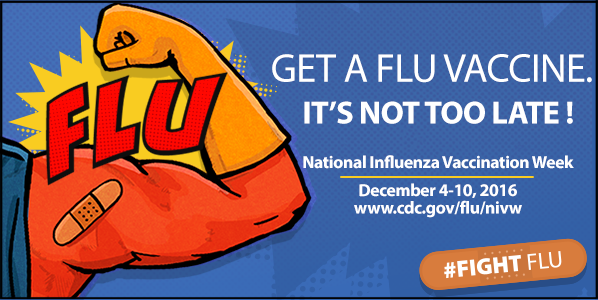Fight the Flu!
 December 4-10 is National Influenza Vaccination Week. If you haven't gotten your flu vaccine yet, now's the time! An annual flu vaccine is the single best way to protect against the flu.
December 4-10 is National Influenza Vaccination Week. If you haven't gotten your flu vaccine yet, now's the time! An annual flu vaccine is the single best way to protect against the flu.
This year, National Influenza Vaccination Week (NIVW) takes place December 4-10, 2016. The Centers for Disease Control and Prevention (CDC) established NIVW in 2005, to highlight the importance of continuing flu vaccination through the holiday season and beyond. NIVW events throughout the week will emphasize the importance of flu vaccination.
Vaccination is the best way to prevent the flu!
As long as flu viruses are spreading and causing illness, vaccination can still provide protection against the flu. Most of the time, flu activity peaks between December and March in the United States, although activity can last as late as May. Flu activity is expected to increase in the coming weeks; the sooner you get vaccinated, the more likely you are to be protected against the flu when activity picks up in your community. View CDC's influenza summary map for a weekly update on flu activity in the United States.
Who Needs a Flu Vaccine?
CDC recommends a yearly flu vaccine for everyone 6 months of age and older as the first and most important step in protecting against seasonal flu viruses. This season, CDC recommends the use of injectable flu vaccines (flu shots) and not the nasal spray flu vaccine. Vaccination to prevent flu is particularly important for people who are at high risk of serious complications from influenza. It takes about two weeks after vaccination for antibodies to develop in the body and provide protection against the flu.

Have you gotten your flu vaccine? It's not too late! It's National Influenza Vaccination Week.
Are You at High Risk?
One of the goals of NIVW is to communicate the importance of flu vaccination for people who are at high risk of developing serious flu-related complications that can lead to hospitalization or even death. Sinus and ear infections are examples of moderate complications from flu, while pneumonia is a serious flu complication that can result from either influenza virus infection alone or from co-infection of flu virus and bacteria. Other possible serious complications triggered by flu can include inflammation of the heart (myocarditis), brain (encephalitis) or muscle (myositis, rhabdomyolysis) tissues, and multi-organ failure (for example, respiratory and kidney failure). Flu virus infection of the respiratory tract can trigger an extreme inflammatory response in the body and can lead to sepsis, the body’s life-threatening response to infection. Flu also can make chronic medical problems worse. For example, people with asthma may experience asthma attacks while they have the flu, and people with chronic heart disease may experience a worsening of this condition triggered by flu. Flu vaccination and the appropriate use of flu antiviral medicines are very important for people who are at high risk of serious flu-related complications.
People at high risk include:
- Pregnant women
- Children younger than 5, but especially children younger than 2 years old
- People 65 years of age and older
- People of any age who have certain medical conditions, such as asthma, diabetes, and heart disease
For a full list of people who are at high risk, visit People at High Risk of Developing Flu-Related Complications.
In addition, flu vaccination is especially important for:
- People who live in nursing homes and other long-term care facilities
- People who live with or care for those at high risk for complications from flu, including
- Health care workers
- Household contacts of persons at high risk for complications from the flu
- Household contacts and out of home caregivers of children less than 6 months of age (these children are too young to be vaccinated)
Flu Vaccine for the 2016-2017 Season!
CDC recommends use of injectable influenza vaccines (including inactivated influenza vaccines and recombinant influenza vaccines) during 2016-2017. The nasal spray flu vaccine (live attenuated influenza vaccine or LAIV) is not recommended for use during 2016-2017 because of concerns about effectiveness. The reason for recent problems with effectiveness of the nasal spray vaccine is not known. Experts are looking into the situation with the hopes that nasal spray flu vaccine will once again be an option for some people. In the meantime, this flu season CDC recommends flu shots not the nasal spray flu vaccine. Flu shots work and can keep you from getting sick!
The 2016-2017 U.S. flu vaccines have been updated for this season. To learn more about the vaccine options available this season, visit Key Facts about Seasonal Flu Vaccine.
In addition to your doctor's office, there are various locations in your community where flu vaccine is available, like your pharmacy, grocery store or local health department. Use the HealthMap Vaccine Finder to find flu vaccine locations near you.
If you're not sure or have questions about which vaccine to get, talk with your doctor or health care professional. For a complete list of who should and should not get vaccinated, visit Guidelines for Flu Vaccination.
Take Everyday Preventive Actions
In addition to getting your flu vaccine this season, CDC also urges you to take everyday preventive actions to protect yourself and your loved ones from flu. Everyday preventive actions include the following:
- Avoid close contact with sick people.
- While sick, limit contact with others as much as possible to keep from infecting them.
- If you are sick, stay home for at least 24 hours after your fever is gone, except to get medical care or other necessities.
- Cover your nose and mouth with a tissue when you cough or sneeze. Throw the tissue in the trash after you use it.
- Wash your hands often with soap and water. If soap and water are not available, use an alcohol-based hand rub.
- Avoid touching your eyes, nose and mouth. Germs spread this way.
- Clean and disinfect surfaces and objects that may be contaminated with germs like the flu.
Additionally, if you get the flu, antiviral drugs can be used to treat your illness. Antiviral drugs are different from antibiotics. They are prescription medicines (pills, liquid or an inhaled powder) and are not available over-the-counter.
Antiviral drugs can make illness milder and shorten the time you are sick. They may also prevent serious flu complications. CDC recommends that antiviral drugs be used early to treat hospitalized patients with flu, people with severe flu illness, and people with flu symptoms who are at high risk of serious flu complications based on their age or health. Treatment with an antiviral drug can mean the difference between having a milder illness versus a very serious illness that could result in a hospital stay. Visit What You Should Know About Flu Antiviral Drugs to learn more.
The Flu Shot is Your Best Shot
As long as flu viruses are spreading and causing illness, flu vaccination can provide protection against the flu. Once vaccinated, you can enjoy this holiday season knowing that you have taken the single best step to protect yourself and your loved ones against the flu.
For more information on what you should know about the current season, visit Frequently Asked Flu Questions 2016-2017 Influenza Season.
- Page last reviewed: December 5, 2016
- Page last updated: December 5, 2016
- Content source:
Error processing SSI file


 ShareCompartir
ShareCompartir